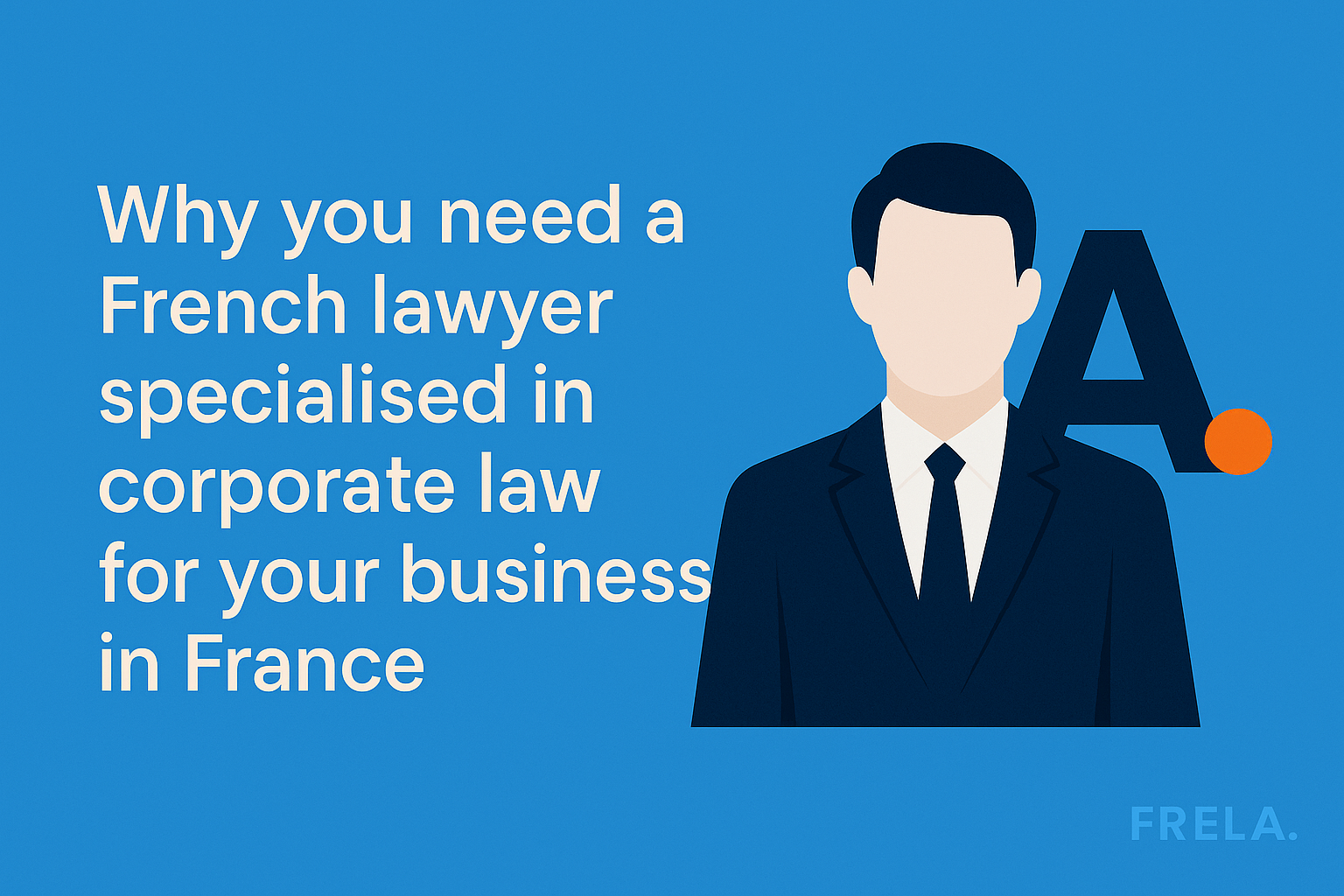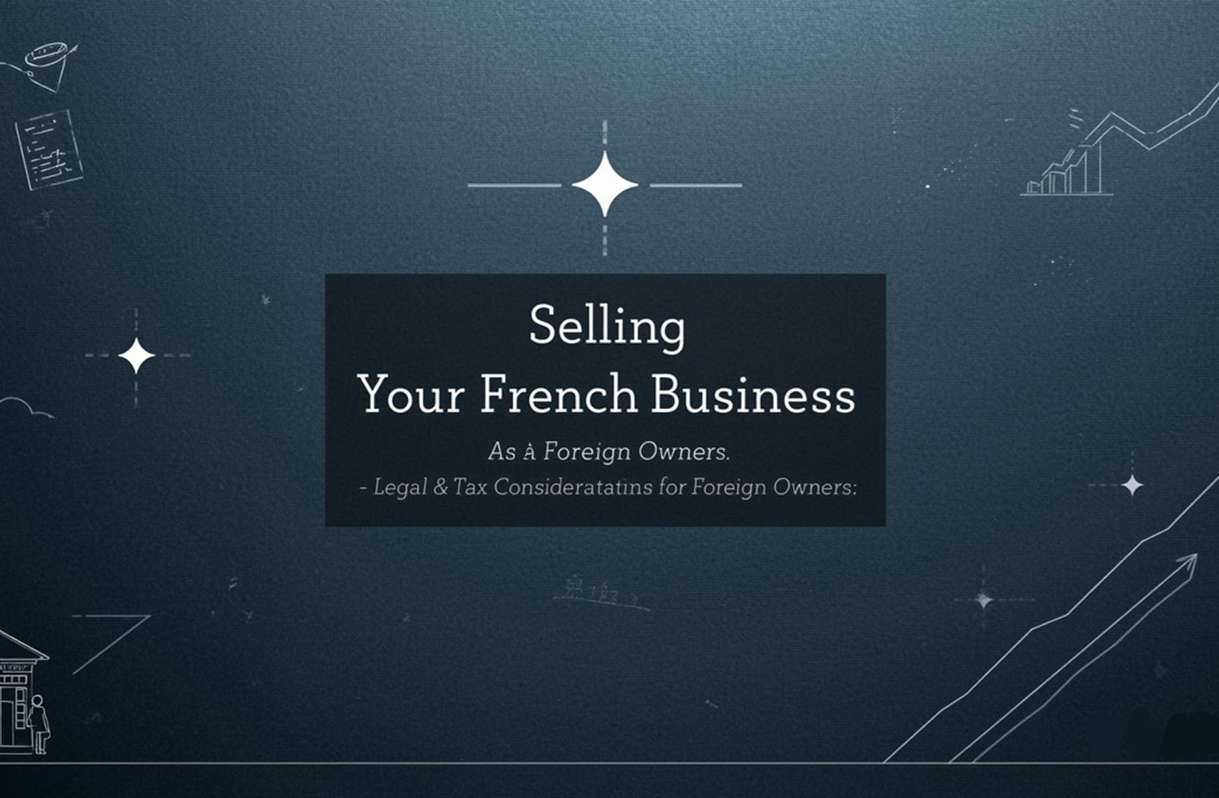Why you need a French lawyer specialised in corporate law for your business in France
Understanding the French legal landscape
France’s legal system is based on comprehensive statutes and codes, which can pose challenges for foreign businesses unfamiliar with civil law. French corporate law is highly codified – chiefly in the French Commercial Code (Code de commerce) and Civil Code – and replete with formalities and requirements that differ from common law systems. All company documents and proceedings must be in French, and official regulations often lack an English equivalent. A local corporate lawyer provides invaluable guidance through this intricate framework. In fact, French corporate law is a complex area of the law which requires specific knowledge about corporate formalities. A French lawyer specialized in corporate law will ensure your business navigates local laws correctly, from registration procedures to annual compliance, preventing costly missteps.


Expertise in French Corporate Structures and Compliance
When establishing or operating a business in France, choosing the appropriate legal entity and maintaining it properly are critical. French law offers various corporate forms – SARL, SAS, SA, etc. – each with distinct rules on liability, governance, and reporting. A French corporate attorney will explain these options in plain terms and help select the structure that best suits your venture. For example, the simplified joint-stock company (Société par Actions Simplifiée, SAS) is popular among foreign investors for its flexibility, whereas an SARL (limited liability company) may suit small or family businesses. Each form is governed by specific provisions of the Commercial Code (e.g. Articles L.223-1–L.223-43 for SARLs or L.227-1–L.227-20 for SAS). A local lawyer’s expertise ensures you meet all formation requirements – such as drafting bylaws, publishing mandatory notices of incorporation, and registering with the French trade registry (RCS) – and continue to fulfill annual obligations (board meetings, account filings, tax declarations, etc.).
Compliance is not optional: under French law, corporate directors face penalties or even personal liability for certain violations. For instance, misuse of company assets by managers is a criminal offense (known as abus de biens sociaux) under the Commercial Code, underscoring the need for careful legal guidance.
By engaging a French corporate lawyer, you ensure your company’s structure and operations remain fully compliant with French statutes and regulations, avoiding fines or administrative sanctions.
Navigating Regulatory Requirements and Risks
Beyond basic company law, doing business in France involves a web of regulations – from tax registration to labor laws – that a foreign company must respect. A French lawyer specialized in corporate matters will proactively identify which local and EU rules apply to your business. For example, they can advise on foreign investment regulations: certain acquisitions by non-French investors require prior government approval if they involve strategic sectors like defense, tech, or critical infrastructure. (Under the Monetary and Financial Code, a non-EEA investor buying over 25% of voting rights in a “sensitive” French company needs Ministry of Economy authorization.) A corporate attorney will alert you to such rules early, guiding you through the approval process or helping structure deals to comply with French law. They will also ensure you meet French tax obligations, such as registering for corporate tax and VAT – which in France carries its own thresholds and rates – and advise on required employment law measures if you hire staff (e.g. compulsory worker protections under the Labor Code). In short, a French business lawyer serves as a risk manager, ensuring all legal requirements are met so that your French venture operates smoothly and lawfully. This mitigates risks ranging from tax penalties to legal disputes with regulators.
Bridging Language and Culture Gaps
Conducting business in France inevitably involves the French language and a distinct legal culture. All corporate filings, contracts, and official communications must be in French or formally translated. A French corporate lawyer acts as both legal counsel and language/culture translator. They will translate complex legal jargon and procedures into clear advice, ensuring you truly understand French documents before you sign. They also bring insight into French business etiquette and expectations – from negotiating styles to the formal tone of legal correspondence. Having a bilingual attorney who can liaise with French notaries, banks, and government offices on your behalf is invaluable. It prevents misunderstandings and expedites processes that might otherwise stall due to language barriers.
Furthermore, French law imposes certain cultural-legal norms (for example, the duty to perform contracts in good faith as required by Article 1104 of the Civil Code). A local lawyer will make you aware of these underlying principles. By bridging the gap between your home jurisdiction and the French system, your lawyer ensures nothing is “lost in translation” – literally or figuratively – when doing business in France.
Strategic Advisory and Local Market Insight
A French corporate lawyer does more than recite black-letter law – they provide strategic advice grounded in local market practice. Years of experience with French business transactions equip these lawyers to advise on what is market-standard or expected in deals, beyond the legal minimum. For instance, French corporate lawyers are familiar not only with the law’s requirements but also with general market practices regarding company transactions (EBITDA multiples, standard amounts of vendor loans, ROI expectations in venture capital deals). This practical insight helps international clients negotiate effectively and structure investments advantageously. Your lawyer can advise how to minimize legal friction in French deals – whether it’s customary representations and warranties in a share purchase agreement, or typical employment protections buyers must honor in an acquisition. They also have networks among local professionals (notaries, accountants, tax advisors) and can coordinate a multidisciplinary team for complex projects, as French practice often demands corporate, tax, and labor expertise working in tandem. In essence, your French corporate counsel becomes a trusted business partner who combines precise legal reasoning with an understanding of the French market environment. This ensures that your company’s decisions in France are not only legally sound but also commercially savvy.
Navigating French and EU Legal Frameworks
Operating in France means adhering to French law within the broader context of European Union law. A France-based corporate lawyer will ensure your business complies with relevant EU directives and regulations as implemented locally. For example, French corporate law has been shaped by EU company law directives on financial reporting and mergers, and French authorities enforce EU competition rules and the General Data Protection Regulation (GDPR) for data privacy. A knowledgeable French attorney will keep you abreast of these supranational requirements. One key EU-driven obligation is the disclosure of ultimate beneficial owners for companies to combat money laundering. French law, aligning with EU Anti-Money Laundering Directives, requires companies to file information on any individual owning >25% of the company. Failing to do so can result in fines. With a French lawyer’s guidance, you won’t overlook such critical compliance steps. Whether it’s observing EU consumer protection standards or taking advantage of EU harmonization (for instance, the EU Cross-Border Mergers Directive that facilitates mergers between a French company and an EU company), your local counsel ensures you leverage and comply with the full legal framework. This comprehensive perspective shields your French business from legal exposure on both the national and European level.
Conclusion
Engaging a French corporate lawyer is an investment in the success and security of your business ventures in France. This specialist brings deep knowledge of French corporate statutes and commercial customs, helping you navigate a complex legal landscape with confidence. From choosing the right corporate form and securing regulatory clearances, to staying compliant with ongoing legal duties, your French lawyer serves as a safeguard against pitfalls that foreign businesses might otherwise overlook. Perhaps most importantly, they offer peace of mind – translating dense French legal requirements into actionable advice, representing your interests before local authorities, and ensuring every contract or corporate decision stands on solid legal ground. In a jurisdiction where precision and formalities matter, a French lawyer specialized in corporate law is not just advisable but essential for international companies aiming to thrive in France’s dynamic business environment.
About the Author :
Business lawyers, bilingual, specialized in acquisition law; Benoit Lafourcade is co-founder of Delcade lawyers & solicitors and founder of FRELA; registered as agents in personal and professional real estate transactions. Member of AAMTI (main association of French lawyers and agents).
FRELA : French Real Estate Lawyer Agency, specializing in acquisition law to secure real estate and business transactions in France.
Paris, 15 rue Saussier-Leroy, Paris
Bordeaux, 24 Rue du manège, 33000 Bordeaux
Lille, 40 Theater Square, 59800 Lille

This article is provided for general information only and may not reflect the most recent legal or tax developments. It does not constitute legal advice. Please contact us for personalised guidance before making any decision.




